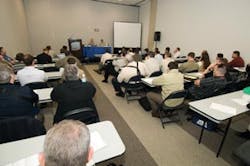Alternative Fuels & the Vehicles/Refueling Stations That Can Accommodate Them
As the issue of alternative fuels in GSE receives heightened attention and new emissions requirements loom, leaders in the subject of alternative fuels converged for a panel discussion on recent product developments. The panel included Joe Lewis of Hydrogen Production Werks LLC, Neal Bennett of eTug LLC, Greg Zilberfarb of Propane Education and Research Council, and Dave Lynch of Cummins Westport Inc. Speaking on the different types of alternatives including hydrogen, propane and electricity, one question remained: Which is the fuel of the future? “What’s going to drive all of our decisions in the future is cost,” Lynch says. “Each of us is going to have to figure out when it comes to a business, where are the economics that make sense for me to move me in an alternative direction?”
Hazardous Materials in Airport Operations: Expect the Unexpected
Ryan Spicer of the environmental affairs department at Dallas/Fort Worth International Airport cited the different types of waste that can ensue from everyday procedures in a seminar on hazardous materials in airport operations. DFW airport — a facility spanning 18,000-plus acres and accommodating about 60 million passengers each year — can generate a large amount of waste, some of which can be produced in unexpected places: from the more commonly regarded issues in commercial and general aviation — fuels, deicing fluids and batteries — to the lesser known waste associated with fleet and building maintenance, medical waste and in-house printing at the airport.
Making the Move From Tier 3 to Tier 4 Emission Standards in GSE
Chamila Tissera, an emissions engineer at Deutz Corp., conducted a presentation on the impending emission requirements facing off-road diesel engines and the move from Tier 3 to Tier 4 standards in the coming years. Discussing the technology behind engine emissions, he presented some of the methodology for lowering such emissions to meet the standards. Offering a look at a potential Tier 4 engine, he says the cost of such a system as yet is undetermined.
Ramp Security Issues Addressed in the CAPA Aviation Security Report Card
Is it safe to fly now? As the director of aviation security at the Coalition of Airline Pilots Associations, Jay Norelius is often posed that question. In the presentation, he spoke of the organization’s Aviation Security Report Card. A “curb-to-cockpit” assessment, the report addressed security concerns on the ramp that included perimeter security, screening and credible identification for ramp employees, and the need for training to help ramp workers recognize potential threats. Norelius says cargo is also an area of concern. Though passenger aircraft will be required to screen all cargo in 2010, he says, freight aircraft have been left susceptible to security breaches. “We believe cargo is an underestimated threat,” he says.
Fire Safety for Ground Support Personnel
Jack Kreckie, a 31-year veteran of fire service and former deputy fire chief at Boston Logan International Airport, spoke on behalf of the Aircraft Rescue Firefighter Working Group for a seminar in fire safety. Addressing fire safety issues on the ramp, he emphasized the importance of training for employees, especially fuelers. “Fuel is probably the greatest risk of this business that we’re involved in,” he says. Though training for fuelers is federally regulated, the standard can vary throughout the industry due to local codes — and variance is common in all types of fire safety training, he says. From fueling training to terminal evacuation planning, Kreckie asked the audience to consider how much training is enough: “Are we satisfying the minimum requirement? Are we satisfied with the minimum?”





